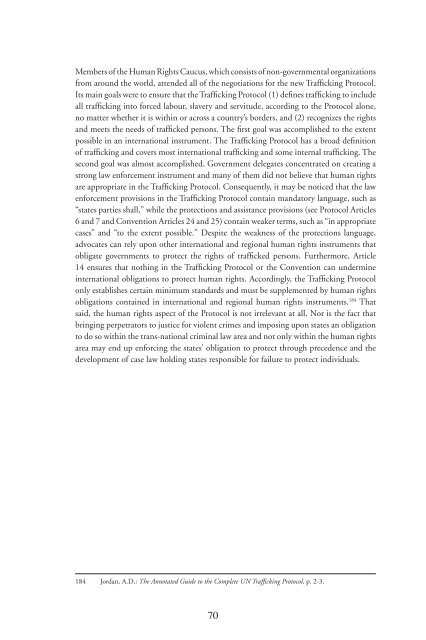Trafficking in human beings: human rights and ... - unesdoc - Unesco
Trafficking in human beings: human rights and ... - unesdoc - Unesco
Trafficking in human beings: human rights and ... - unesdoc - Unesco
You also want an ePaper? Increase the reach of your titles
YUMPU automatically turns print PDFs into web optimized ePapers that Google loves.
Members of the Human Rights Caucus, which consists of non-governmental organizations<br />
from around the world, attended all of the negotiations for the new Traffi ck<strong>in</strong>g Protocol.<br />
Its ma<strong>in</strong> goals were to ensure that the Traffi ck<strong>in</strong>g Protocol (1) defi nes traffi ck<strong>in</strong>g to <strong>in</strong>clude<br />
all traffi ck<strong>in</strong>g <strong>in</strong>to forced labour, slavery <strong>and</strong> servitude, accord<strong>in</strong>g to the Protocol alone,<br />
no matter whether it is with<strong>in</strong> or across a country’s borders, <strong>and</strong> (2) recognizes the <strong>rights</strong><br />
<strong>and</strong> meets the needs of traffi cked persons. The fi rst goal was accomplished to the extent<br />
possible <strong>in</strong> an <strong>in</strong>ternational <strong>in</strong>strument. The Traffi ck<strong>in</strong>g Protocol has a broad defi nition<br />
of traffi ck<strong>in</strong>g <strong>and</strong> covers most <strong>in</strong>ternational traffi ck<strong>in</strong>g <strong>and</strong> some <strong>in</strong>ternal traffi ck<strong>in</strong>g. The<br />
second goal was almost accomplished. Government delegates concentrated on creat<strong>in</strong>g a<br />
strong law enforcement <strong>in</strong>strument <strong>and</strong> many of them did not believe that <strong>human</strong> <strong>rights</strong><br />
are appropriate <strong>in</strong> the Traffi ck<strong>in</strong>g Protocol. Consequently, it may be noticed that the law<br />
enforcement provisions <strong>in</strong> the Traffi ck<strong>in</strong>g Protocol conta<strong>in</strong> m<strong>and</strong>atory language, such as<br />
“states parties shall,” while the protections <strong>and</strong> assistance provisions (see Protocol Articles<br />
6 <strong>and</strong> 7 <strong>and</strong> Convention Articles 24 <strong>and</strong> 25) conta<strong>in</strong> weaker terms, such as “<strong>in</strong> appropriate<br />
cases” <strong>and</strong> “to the extent possible.” Despite the weakness of the protections language,<br />
advocates can rely upon other <strong>in</strong>ternational <strong>and</strong> regional <strong>human</strong> <strong>rights</strong> <strong>in</strong>struments that<br />
obligate governments to protect the <strong>rights</strong> of traffi cked persons. Furthermore, Article<br />
14 ensures that noth<strong>in</strong>g <strong>in</strong> the Traffi ck<strong>in</strong>g Protocol or the Convention can underm<strong>in</strong>e<br />
<strong>in</strong>ternational obligations to protect <strong>human</strong> <strong>rights</strong>. Accord<strong>in</strong>gly, the Traffi ck<strong>in</strong>g Protocol<br />
only establishes certa<strong>in</strong> m<strong>in</strong>imum st<strong>and</strong>ards <strong>and</strong> must be supplemented by <strong>human</strong> <strong>rights</strong><br />
obligations conta<strong>in</strong>ed <strong>in</strong> <strong>in</strong>ternational <strong>and</strong> regional <strong>human</strong> <strong>rights</strong> <strong>in</strong>struments. 184 That<br />
said, the <strong>human</strong> <strong>rights</strong> aspect of the Protocol is not irrelevant at all. Nor is the fact that<br />
br<strong>in</strong>g<strong>in</strong>g perpetrators to justice for violent crimes <strong>and</strong> impos<strong>in</strong>g upon states an obligation<br />
to do so with<strong>in</strong> the trans-national crim<strong>in</strong>al law area <strong>and</strong> not only with<strong>in</strong> the <strong>human</strong> <strong>rights</strong><br />
area may end up enforc<strong>in</strong>g the states’ obligation to protect through precedence <strong>and</strong> the<br />
development of case law hold<strong>in</strong>g states responsible for failure to protect <strong>in</strong>dividuals.<br />
184 Jordan, A.D.: The Annotated Guide to the Complete UN Traffi ck<strong>in</strong>g Protocol, p. 2-3.<br />
70

















